What holiday dangers for dogs are lurking in your home? Integrative veterinarian Dr. Julie Buzby uncovers 10 common Christmas culprits that can be hazardous for your dog. Learn how to protect your pet with these safety tips, and keep the season merry for your dear dog.
Twas the time before Christmas and strewn through my home,
I found hidden dangers where my doggos would roam!
Can you relate? As I get my home ready for Christmas each year, I’m always careful to pet-proof everything because “not a creature was stirring” is merely a fairy tale in my book!
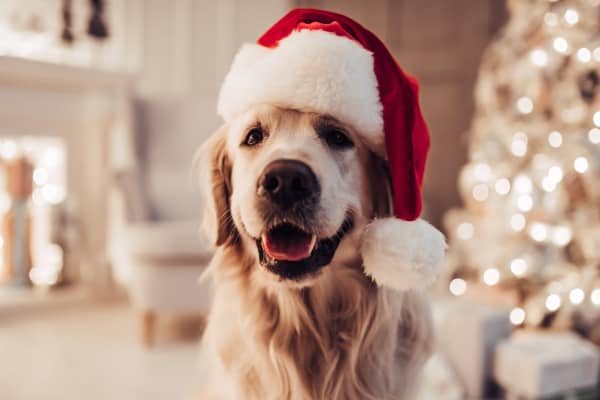
10 holiday dangers for dogs
There are many potential dangers for our curious pets to discover during the holiday season, especially our dear dogs. That’s why it’s important to get prepped by knowing these 10 dog safety tips for the holidays.
1. The Christmas tree
Christmas trees can look like an outdoor adventure housed in the living room! The novelty of an indoor tree may be too much for some pets to resist. (Cats are especially notorious for climbing them or knocking them over.)
Dogs and cats alike may be tempted to chew on the light strands or even the electrical cords connected to the wall. This can result in electrical shock, which may cause a lethargic dog, electrical burns, difficulty breathing, and even death.
Pine needles, tree ornaments, and tinsel can cause gastrointestinal obstructions if ingested, requiring emergency surgery in most cases. Make sure to sweep up pine needles often and hang ornaments high on your Christmas tree. Don’t forget that happy tails may knock ornaments off lower branches. Tinsel should be avoided in pet-friendly homes.
Live Christmas trees can also pose a threat to some dogs who view the base as their new holiday water bowl. Be sure not to add anything to the water that could be harmful if your pet drinks out of it.
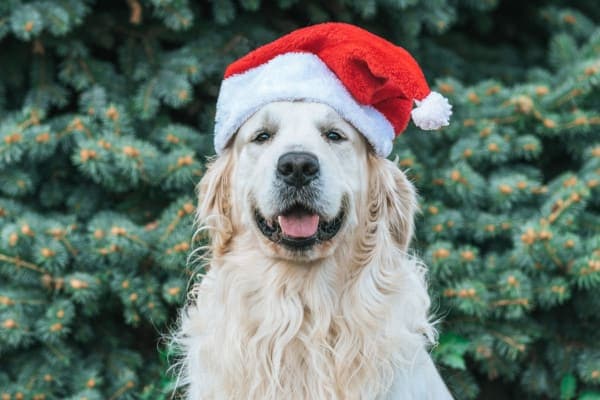
2. Holiday foods
Many of the meats, baked goods, and sweet treats that we enjoy during the holidays can cause gastrointestinal upset in dogs, including vomiting and diarrhea. Rich, fatty foods like buttery treats, desserts, turkey skin, gravy, and ham can cause inflammation of the pancreas—also called pancreatitis in dogs—which manifests in abdominal pain, vomiting, and inappetence. Even small amounts of some human foods can cause pretty significant stomach upset.
Fudge, chocolate-covered pretzels, and other Christmas goodies are also dangerous. The answer to the question “Can dogs have chocolate?” is a resounding “No” as you may already know. Unfortunately, chocolate toxicity can cause severe clinical signs and, sadly, sometimes even death.
Along with chocolate, you may be wondering about another popular sweet treat at the holidays: peppermint and candy canes. Here’s a definitive answer to a common question I hear from pet parents…
Can dogs eat candy canes?
Not only can the plastic wrapping on candy canes cause gastrointestinal issues, but some candy canes and other Christmas candies (especially those labeled sugar free) contain xylitol, an artificial sweetener that is toxic for dogs. Xylitol and dogs don’t mix. If ingested, it can cause severe low blood sugar and even acute liver failure in dogs.
(In our house, we like to put candy canes on our Christmas tree. However, we keep them up very high so that our dogs aren’t tempted to snatch them.)
Fruitcakes, cookies, and other treats containing raisins should also be kept out of reach. Raisins and grapes are dangerous for dogs, and can cause kidney failure.
While most dogs do love chewing on bones, resist the urge to give them scraps from turkey or ham carcasses. The bones can cause stomach upset, intestinal obstruction, and dental problems like fractured teeth. Make sure to secure the trash once bones are disposed of—the temptation to tip over the can may be too hard to resist!
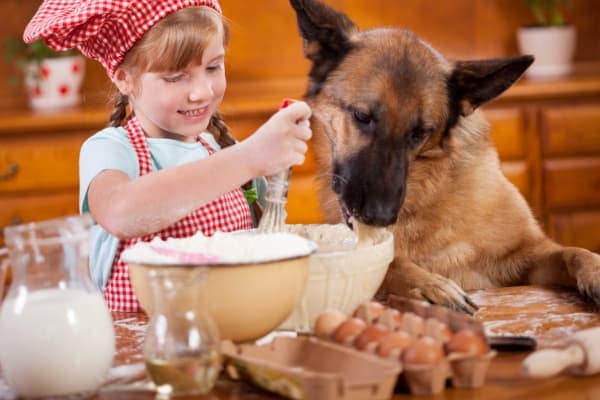
All family members should be on board with a grinchy “just say no” policy to indulging pets with holiday foods during this season of giving. Also, if some of the same holiday recipes that you served for your Thanksgiving feast will be on your Christmas table, please read my post, 9 Classic Thanksgiving Foods Dangerous to Dogs.
3. Christmas decorations
Depending on their composition, holiday decorations can be problematic for dogs. If you have glass decorations, make sure to keep these out of reach of your dog. Pets can accidentally break them and may even ingest the pieces, which can result in cuts in the mouth and irritation or puncture to the lining of the esophagus and stomach. Stepping on a piece of glass and cutting a paw is also a concern.
Also, keep in mind that many old-fashioned large Christmas light bulbs are made from glass, which can not only shatter, but may also contain a liquid chemical that is toxic to pets. Make sure to keep these and all of your glass decorations well out of your dog’s reach!
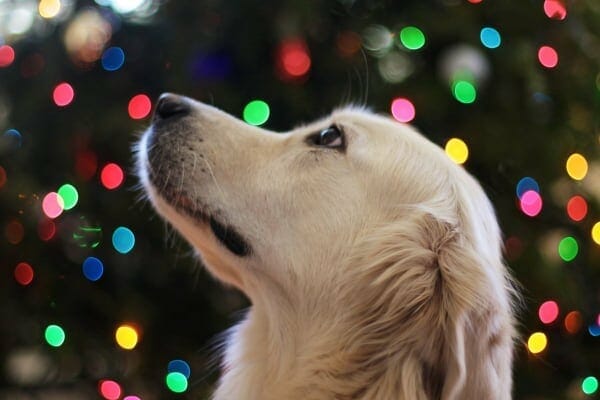
Additionally, electrical cords powering special holiday lights and decorations pose a real hazard. I don’t know why dogs like to chew on electrical cords, but having treated several dogs with burns in the mouth and facial swelling from this life-threatening activity, I know electrical shock is a genuine hazard. Severe cases can cause respiratory issues and even death.
What should you do it your dog eats Christmas lights?
If your dog is chewing Christmas lights and eats them, seek veterinary care sooner rather than later. Broken bulbs can cause injury. Swallowing a portion of a light strand may result in a linear foreign body obstruction, which is a surgical emergency. (Other holiday linear foreign body culprits – especially in cats! – are tinsel and ribbons.)
It is very important to never pull a string from your animal’s mouth once they’ve swallowed a portion of it – and equally important to not pull a string from “their other end.” Doing so may cause irritation or even tearing of the GI tract!
Of course, there’s also additional risk of electrocution for dogs chewing on or eating Christmas lights when they’re plugged in.
4. Metal ornament hooks
Many people use metal ornament hooks to hang their Christmas ornaments on the tree. However, metal ornament hooks can be very sharp, and therefore painful if your dog (or you!) were to step on them.
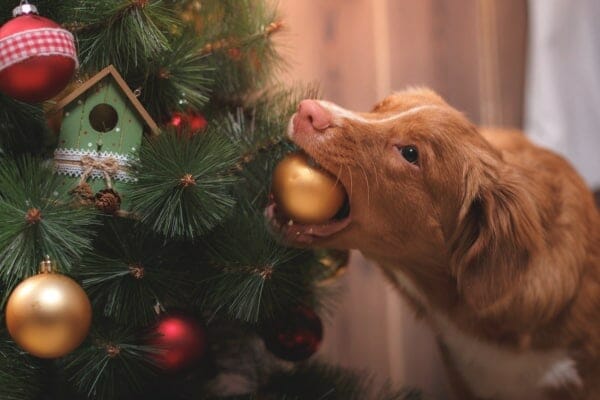
In the continuing saga of why dogs chew on/eat strange things, metal ornament hooks can also play the role of villain. If ingested, the sharp end of the hook can perforate the dog’s stomach or the intestines.
What should you do if your dog ate a Christmas ornament hook?
Gastrointestinal foreign bodies like metal Christmas tree hooks are surgical emergencies. Make sure to seek veterinary care right away if you suspect your dog has ingested a metal ornament hook. To avoid this risk, I recommend a product called SoftHooks (paper-based ornament hooks) to my clients.
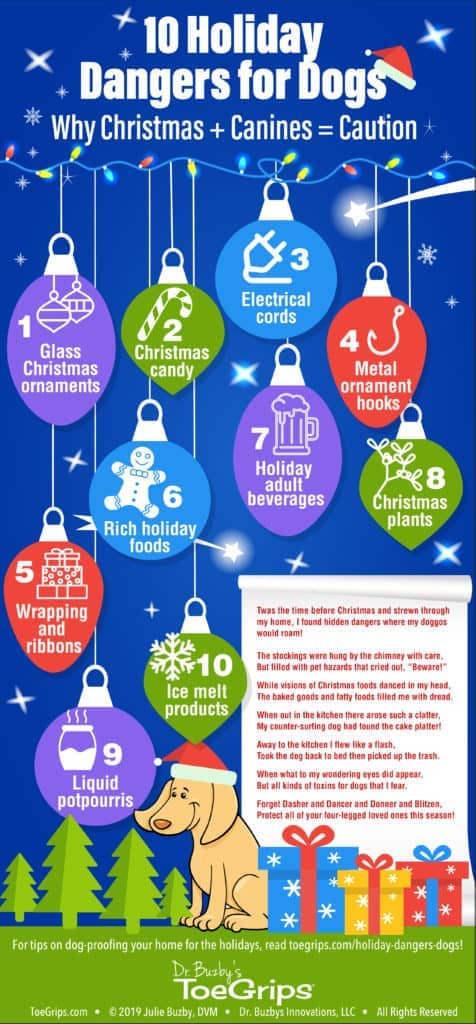
5. Christmas presents
Dogs might be tempted to chew on presents, especially if there is food inside—and usually food items that make good gifts are on the doggy “no no” list.
Wrapping paper, boxes, bows, and ribbons can cause gastrointestinal obstructions if ingested, not to mention any hazards inside the gifts themselves.
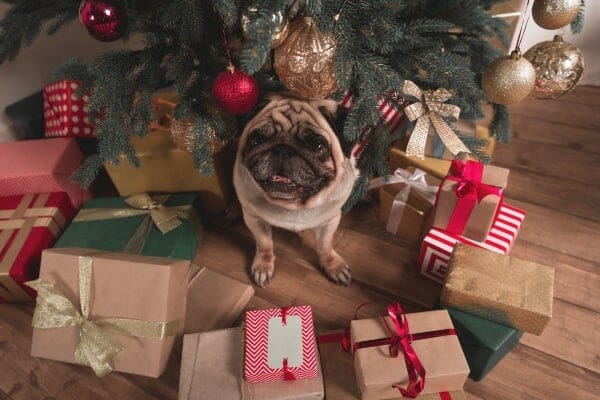
Keep in mind that large, heavy presents may cause injury if they fall over. Suffice it to say that getting into mischief with wrapped presents under the tree is a temptation for children and pets alike.
6. Holiday beverages containing alcohol
Dogs do not metabolize alcohol in the same way that humans do. If dogs ingest alcohol, their blood sugar can sharply decrease. They can also have seizures and difficulty breathing.
Typically, eggnog recipes contain alcohol as do many other holiday adult beverages. Be sure to keep these sweet temptations out of reach of your pets.
7. Holiday plants
Plants such as holly, mistletoe, and ivy can also pose holiday dangers to dogs, as many are poisonous to pets. If they are ingested in small portions, they can cause mild gastrointestinal upset and mouth pain because these plants have spiny leaves that can cause physical irritation.
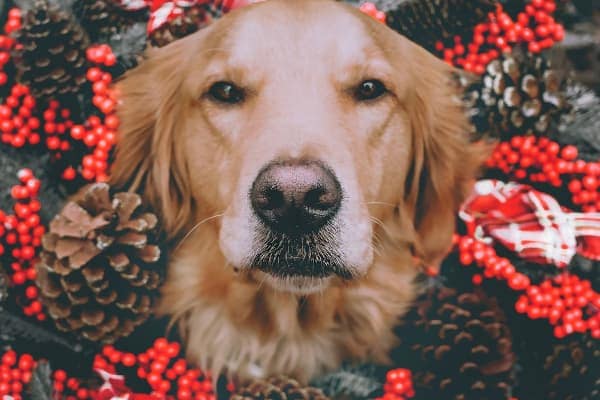
Ingesting larger amounts of these plants can cause even more serious illnesses in dogs. Dizziness and stumbling, seizures, and even death can occur. If you suspect that your dog has ingested one of these plants, call your veterinarian right away.
Every pet owner should keep the phone number for animal poison control handy because most poison control centers are open 24/7 and can advise you on what steps to take if your regular vet is not available right away. The ASPCA Animal Poison Control Center is a great resource. (Please note, there is a consulting fee associated with the ASPCA’s service.)
8. Well-meaning houseguests and visitors
For me, the best part of Christmas is getting together with family and friends. Nothing fills my heart more than the bustle and noise of a full house.
Unfortunately, not all of our friends and family members are as diligent about pet safety as we are. In addition to their occasional desire to slip food scraps under the table, guests may inadvertently bring dangerous items into the house. Make sure personal items such as purses are stored out of reach to prevent prying paws from investigating and potentially getting into dangers like prescription and OTC medications, hand sanitizer, coins, etc.
Also, not every dog is a party animal. With people coming and going, ensure your dog has a safe place to escape the hustle and bustle if they get stressed. It’s also a good idea to ensure your dog’s tag or microchip has up-to-date contact information. With guests coming and going, it’s easy for a beloved dog to slip out the door.
9. Liquid potpourris
Liquid potpourris and oils or candles are a great way to make your home smell like Christmas. However, these items can be toxic if ingested and can cause thermal burns. Furthermore, licking these products can also cause severe chemical burns and even difficulty breathing.
10. Ice melt products

Sprinkling ice melt on your sidewalk before your holiday guests arrive may keep them safe, but it may put your dog at risk. These salt-based products can cause paw irritation and lead to gastrointestinal upset if ingested even in small quantities. If a large amount of the salt-based mixture is ingested, dogs can exhibit vomiting, increased thirst, and rapid brain swelling, which can lead to seizures.
11. Bonus tip! Busting the myth about poinsettias and dogs
For as long as I can remember, I’ve heard people talk about how poinsettias are toxic for dogs. However, the poinsettia plant is not as toxic as the other holiday plants mentioned above. If ingested, it can cause mild gastrointestinal signs, but probably not a serious issue. Still, it’s better to be safe than sorry, so please keep your dog and your holiday plants apart.
Merry Christmas to all and to all a safe night
Your dog’s health is important year-round, and prevention is the best way to keep him or her healthy! If you’re preparing for Christmas, I hope part of your planning includes dog-proofing your home. Remember that your regular veterinarian may have different hours during the holidays, so ensure you have contact information for the nearest emergency veterinarian just in case your dog needs an emergency vet visit!
For a little holiday safety fun, please enjoy my dog-friendly twist on a classic Christmas poem…
Twas the time before Christmas and strewn through my home,
I found hidden dangers where my doggos would roam!
The stockings were hung by the chimney with care,
But filled with pet hazards that cried out, “Beware!”
While visions of Christmas foods danced in my head,
The baked goods and fatty foods filled me with dread.
When out in the kitchen there arose such a clatter,
My counter-surfing dog had found the cake platter!
Away to the kitchen I flew like a flash,
Took the dog back to bed then picked up the trash.
When what to my wondering eyes did appear,
But all kinds of toxins for dogs that I fear.
Forget Dasher and Dancer and Donner and Blitzen,
Protect all of your four-legged loved ones this season!
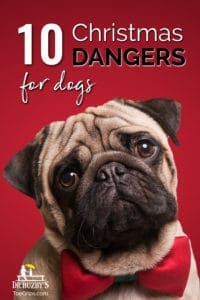
How do you protect your dog from potential holiday hazards?
We’d love to hear your ideas! Please comment below.


I use SoftHooks paper ornament hooks instead of metal or plastic hooks.
Great tip, Lena! I’m a big fan of Softhooks!